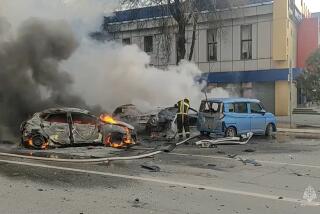Ethiopia Targets Eritrean Reservoir in Fighting
- Share via
ASSAB, Eritrea — Ethiopian jets have dropped at least 12 bombs near a reservoir outside a key port in eastern Eritrea, an Eritrean military commander said. There were no casualties.
Six of the bombs that fell Tuesday exploded in the desert sand at night, and an Eritrean official said they contained napalm.
The Horn of Africa neighbors are fighting over disputed territory along their 620-mile border. Troops continued shelling for the third day Tuesday along the Burie front, 45 miles southwest of the Red Sea port of Assab.
Tensions over their unmarked border have simmered since Eritrea gained independence from Ethiopia in 1993.
Hagos Woldu, an Eritrean Foreign Ministry official, said the Ethiopian planes dropped napalm but missed the Harsile reservoir, 12 miles west of Assab.
However, an Ethiopian government spokeswoman, Selome Tadesse, said that the bombing runs had destroyed the site. She also said a separate airstrike on an Eritrean military supply camp in the town of Harsile destroyed armored vehicles, heavy artillery and military rations.
The competing claims could not be independently verified.
Lt. Col. Alemseghed, an Eritrean commander who goes by only one name, said the airstrike against the reservoir was a warning that Ethiopia is capable of bombing Assab, 350 miles southeast of Asmara, the capital.
“It’s a good warning, definitely,” Alemseghed said. “If they try to target the water supply, it’s no problem to try the port.”
Water supplies, which are scarce in this arid region, have been singled out as strategic targets. Alemseghed said the army has a backup water supply.
Assab was an important commercial seaport supplying Ethiopia with 80% of its shipments before war broke out in May over border disputes. Since then, Ethiopia has moved its shipments to the port of neighboring Djibouti to the east, leaving Assab with little business.
Several weeks of border fighting and air bombardments in May and June left 1,000 people dead before both sides adopted a U.S.-brokered moratorium on airstrikes in June.
Low-scale fighting simmered for the next eight months, with troops massed on both sides of the border exchanging sporadic artillery fire until fierce fighting erupted Feb. 6.
Alemseghed said Eritrean troops were now remaining in defensive positions.
Also Tuesday, Eritrea applied to the World Court to intervene in its war with Ethiopia, but the court said it can take no action because Ethiopia does not recognize the U.N. panel’s jurisdiction.
More to Read
Sign up for Essential California
The most important California stories and recommendations in your inbox every morning.
You may occasionally receive promotional content from the Los Angeles Times.












